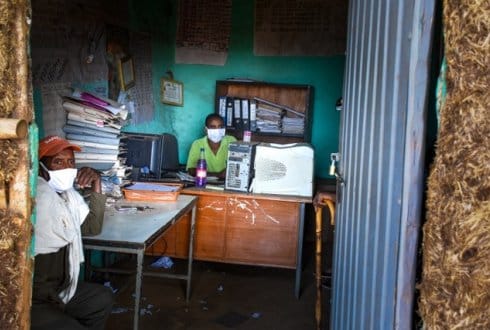Wageningen University & Research launches an important synthesis on effects of the COVID-19 crisis on the seed sector in four countries this week, informing stakeholders in other low and middle income countries facing similar challenges with insights and options to act.
Rapid assessments give insight in impact
In a joint approach with national partners rolled out in May 2020, Wageningen Centre for Development (WCDI), part of WUR, has conducted rapid assessments of the impact of the crisis on the functioning of the seed sector in Ethiopia, Myanmar, Nigeria and Uganda. Walter de Boef, senior seed sector advisor at WCDI: ‘One of the major effects of the lockdowns is that mobility is restricted and social distancing measures are in place. This prevents the virus from spreading, but also leads to critical limitations in access to labour and agricultural inputs. It hinders field inspections and the production of quality seed that’s needed to ensure future availability of quality seed and thus productive crops.’
The restrictions may have a high impact on the seed sector on the long term. De Boef: ‘Current constraints in the production, transportation and marketing of seed will increase its price. We see similar effects on the restrictions on labour. These rising prices mean the affordability of seed is reduced in the near future to many farmers throughout Africa and Asia, which may trigger low production, food production and less income.’
Key responses for resilient seed systems
The rapid assessments conducted showed variations in the stages in the COVID-19 pandemic in the four countries and in the type of measures that each government was taking to control the spread of the virus. Also, the timing of the growing season of each countries primary crops differed. These variations provide a setting for learning lessons on the different contexts and stages of the crisis, government measures, social and economic responses, and their impact on the seed sector and on options how to respond to specific challenges.
De Boef: ‘Our aim is to gain insights into the changing conditions of the crisis, in relation to government measures, and social and economic responses. We want to identify emerging challenges and explore ways to address them, taking into account the seasonal agricultural calendar of certain crops, and working within the strict timeframe of the crisis. We work closely with our partners who are able to reach out and involve all stakeholders on the ground. By working together rapidly defining responses, initiating and where necessary driving action, we enhance and contribute to the resilience of the seed sector.’ The complete seed synthesis can be found here.
Impact on other food sectors
In June and July 2020, similar assessments cover the impact of the COVID-19 crisis on the functioning of other sectors that include sesame and fertilizers in Ethiopia and horticultural sectors in Cote d’Ivoire, Ghana and Rwanda. De Boef: ‘Working with a similar model in various sectors and countries within a specific timeframe allows us to see the impact of the COVID-19 crisis on food systems at national, regional and global level. The rapid assessments provide us with information to contribute to more resilient food systems in the future.’
Guiding sector transformation
Wageningen Centre for Development Innovation works on sector transformation in several low and middle income countries in Africa and Asia, with the aim to make food systems more resilient. Our recently developed educational film ‘Guiding seed sector transformation: lessons for policy-makers and practitioners’ gives insight in how resilient seed sectors can be established. The film draws these lessons from ISSD Ethiopia, a programme of the BENEFIT Partnership.
Source: Wageningen University & Research











